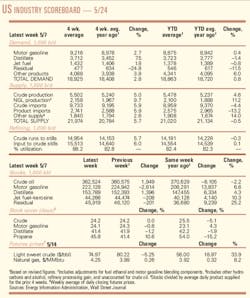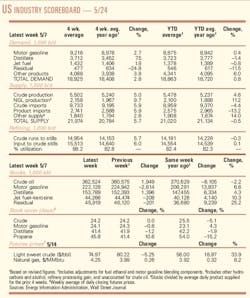Fitch: 'Reasonably sized' downstream deals to have modest impact
Measured withdrawal from downstream operations by large integrated oil companies has slashed refinery acquisition values from high levels prevalent a few years ago.
But a widening spread between US and European crude prices might counter the trend in the US interior by encouraging investments aimed at capitalizing on discounted feedstock, according to Fitch Ratings.
Analysts at the firm described key refining trends in an industry assessment concluding, "Given current conditions, reasonably sized deals are likely to have modest impact on key credit metrics for most names in the sector."
In addition to shrunken acquisition values and widening US-European crude-price differentials, the credit-rating firm noted strong cash flows from refining and "a backdrop of improving supply-demand fundamentals."
'Nosebleed multiples'
Fitch said recent refinery acquisition values, by its calculations, have ranged from as low as $765/b/d of capacity to, more commonly, $2,000-3,000/b/d (see table).
It said a drop in valuation multiples might show sellers have become unwilling to wait for strategic buyers in their eagerness to shed downstream properties and increase investment in higher-return projects upstream.
And it contrasted recent valuations with what it described as "nosebleed multiples paid for refining assets just a few years earlier during the 'golden age of refining.'"
Peak transactions, it said, included the 100,000 b/d refinery in Wilmington, Calif., that Tesoro Corp. bought from Shell at a calculated value of $16,300/b/d of capacity and the stake Citgo sold to Lyondell in the 268,000 b/d Houston refinery the companies had operated as a joint venture, valued at $16,047/b/d. Both deals occurred in 2007.
Fitch nevertheless pointed to more-recent deals with relatively elevated values involving buyers that "might be thought of as strategic." In this category it included Lukoil's acquisition of a 45% stake in Total's refinery in the Netherlands at a calculated value of $8,439/b/d of capacity, Rosneft's purchase of a 50% interest in Ruhr Oel of Germany at $6,868/b/d, and PetroChina's offer of a 50% stake in the European refining business of INEOS at $4,833/b/d.
"Russian oil and gas companies remain interested in downstream integration in the European market, which is a primary outlet for their crude oil sales," Fitch said. "Similarly, in a number of cases oil and gas companies have partnered with European refiners to expand internationally, gain access to end-user markets, and allow access to technological and operational know-how of more sophisticated/developed refining markets."
Limiting risk
The firm said improving financial performance across the North American downstream industry might further limit deal-financing risk by increasing the share of funding that can be made with current liquidity.
High and volatile crude oil prices remain a risk because of the potential for further demand destruction and associated increase in working capital needs. Another risk for US refineries is steadily increasing regulatory pressure, Fitch said.
For US refiners able to take advantage of "cheaper, landlocked North American crudes," the growing discount of West Texas Intermediate to Brent crude has created "a windfall." The price differential has developed partly because of a logistical bottleneck at Cushing, Okla., the US pricing hub. Fitch doesn't expect that pressure to ease "for at least the next several quarters."
The development, the firm said, "opens up the possibility of renewed incentives to increase downstream activity to capture this differential." Future deals might include debottlenecking of refineries, joint ventures linking Midcontinent refiners with producers, or acquisitions.
"This dynamic may also cause Midcontinent mergers and acquisitions to buck the broader trend of low-priced deals," Fitch said.
More Oil & Gas Journal Current Issue Articles
More Oil & Gas Journal Archives Issue Articles
View Oil and Gas Articles on PennEnergy.com

